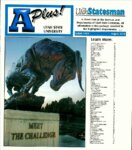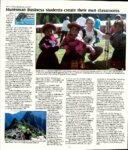| OCR Text |
Show A-PLuat ORIENTATION • FALL2OIO • PACE 21 Why should you consider Graduate Studies at Utah State? As a Carnegie Doctoral/Research Extensive University, USU ranks among America's leading institutions. MEET THE CHALLENGE research USU's distinguished faculty work closely, with graduate students to create a rigorous, yet relaxed, learning environment that promotes strong collegial ties between faculty and students. Graduate degrees are offered by 40 departments, and include 96 master's programs, 38 doctoral programs, as well as six educational specialist and one civil engineer degree. Nationally and internationally known research units support many graduate degree programs, and graduate students typically are actively involved as research assistants and teaching assistants in their discipline. In addition, a wide variety of financial assistance is available to USU graduate students. College of Agriculture: Opportunities for graduates of Utah State University's agricultural degree programs are abundant. In addition to high placement rates in professional schools and advanced degree programs, alumni have pursued careers as biomedical researchers, ranchers, teachers, greenhouse operators, journalists, banking, international trade, policy development and regulation, and many, many others. Master's degrees can be earned in agricultural systems technology, applied economics, dairy science, dietetics administration, food microbiology and safety, or professional studies in horticulture. Master's or doctoral degrees are available in animal science, bioveterinary science, biometeorology, economics, ecology, nutrition and food science, plant science, soil science, or toxicology. For more information, please call (435) 7972200 or visit ag.usu.edu. . Graduate Studies Jon M. Huntsman School of Business: The Jon M. Huntsman School of Business at Utah State has the academic and professional background to prepare students for careers ranging from management to economics. The Huntsman School of Business offers master's degrees in accounting, business administration (MBA), management information systems, economics, and human resources. College of Education and Human Services: The Emma Eccles Jones College of Education and Human Services is ranked in the top 2% among the nation's 1200 Graduate Colleges of Education for 2011 by U.S. News and World Report. Graduate students secure rewarding careers in academia or in applied settings, serving individuals, consumers, or families in schools, businesses, or state and federal agencies. Master's degrees are offered in communicative disorders and deaf education; elementary and secondary education; family, consumer, and human development; health, physical education, and recreation; instructional leadership; instructional technology and learning sciences; psychology; and special education and rehabilitation counseling. The Educational Specialist (EdS) degree is offered in curriculum and instruction, communicative disorders and deaf education, instructional technology and learning sciences, psychology, and disability disciplines. Three doctoral degrees are offered: the AUD in audiology; the PhD in family and human development, instructional technology and learning sciences, psychology, and disability disciplines; and the PhD and EdD in the curriculum and instruction doctoral program. The College houses the Center for Persons with Disabilities, the Center for the School of the Future, the Emma Eccles Jones Early Childhood Education and Research Center, the Dolores Dore Eccles Center for Early Care and Education, and the National Center for Hearing Assessment and Management. These major research and humaji services centers provide support for graduate students through assistantsnips or employment. The Edith Bowen Laboratory School, a K-5 charter school, serves as a practicum site for students and research site for students and faculty. College of Engineering: The College of Engineering is a creative learning environment that prepares engineering students to both support the needs of industry and to develop new technologies and services that will improve tomorrow's economy and environment. The graduate programs are focused around the research interests of our faculty. They include the following multidisciplinary research topics: Advanced Materials and Manufacturing (Analysis of Advanced Structures, Advanced Manufacturing, Biomaterials, Materials Processing, Control of Flows in Manufacturing, and VLSI Design); Engineered Biological Systems (Bioprocess Systems, Bioenvironmental Systems, Biophotonics, Engineered Cellular Systems); Engineering & Technology Education (Assessment, Freshman experience, K-12 Curriculum, Technology-enhanced Learning Environments); Resource Sustainability (Natural Systems Engineering, Hazardous and Toxic Waste Remediation, Water Resources Planning and Management, Water Quality Engineering and Management, Risk Assessment and Management, Contaminant Hydrogeology, Surface and Subsurface Hydrology, Air Quality Engineering and Management, Irrigation Engineering); Intelligent Infrastructure (Control Systems and Robotics, Electromagnetics and Wireless, Geotechnical Engineering, Hydraulic Systems Engineering, Infrastructure Renewal, Networks and Concurrent Systems, Signals and Communications, Transportation Networks); and Sensory Extension (Bioinstrumentation, Biosensors, Geomatics, Space and Aerospace Technologies, Optics & Photonics, Computational Fluid Dynamics, Speech Processing, and Image Processing) The College of Humanities and Social Science offers Master's degrees ranging from a folklore emphasis in American Studies to interdisciplinary degrees in international rural and community development (Sociology). Other master's degrees include: English, History, Political Science, and Sociology. A master's degree in second language teaching is also offered. There are two PhD degree programs in the College: one in Sociology and the other in English (theory and practice of professional communication). Graduate students in the college participate in research activities both locally and internationally as well as partici- pate in teaching within their respective departments. College of Natural Resources: With a worldclass faculty that is committed to research and graduate education, the College of Natural Resources at USU is one of the world's premier academic institutions to study natural resources and environmental science and management. The College attracts students from throughout the US and many foreign countries. Most graduate students in the College are provided research assistantships and other necessary support for their research. Research is conducted in modern, well-equipped research laboratories on campus, at university research stations. Field studies are being conducted throughout Utah and the intermountain west, but also at locations around the U.S. and the world. A diversity of graduate programs allow students to prepare for almost any natural resources or environmentally related career. Graduate students may earn MS and PhD degrees in ecology, fisheries biology, forestry, human dimensions ofecosystem science and management, range science, recreation resource management, watershed science, and wildlife biology. MS degrees can be earned in bioregional planning and geography. The Master of Natural Resources, a non-thesis professional degree, is also offered on campus and through distance education as online and short courses. To supplement their graduate degrees, students throughout the university may earn graduate certificates in the National Environmental Policy Act and in natural resources and environmental education. College of Science: Science programs at Utah State are supported by the research grants and facilities that have made USU a research university with "high research activity" as designated by the Carnegie Foundation. MS and PhD programs include biochemistry, biology, chemistry, computer science, geology, mathematics, physics, and toxicology. In addition, MS degrees in industrial mathematics, statistics, and a Master of Mathematics (MMath) degree and Master of Computer Science (MCS) degree are offered. Speech major is popular, useful The Department of Languages, Philosophy and Speech Communication is pleased to announce an opportunity for those interested in developing communication skills and preparing for careers that involve social influence or a knowledge of organizational, interpersonal, or intercultural communication. Although it is difficult to know what exciting careers will evolve in the future, it is generally agreed that most will require effective communication, ability to work well with people from a variety of cultures, experience in creating and fc Page 22 |













































































